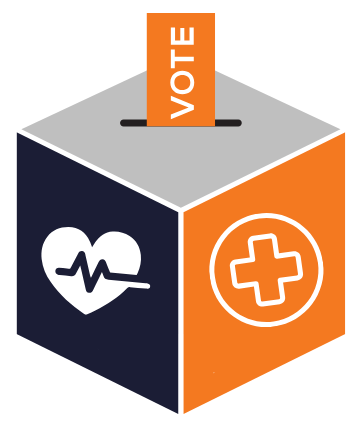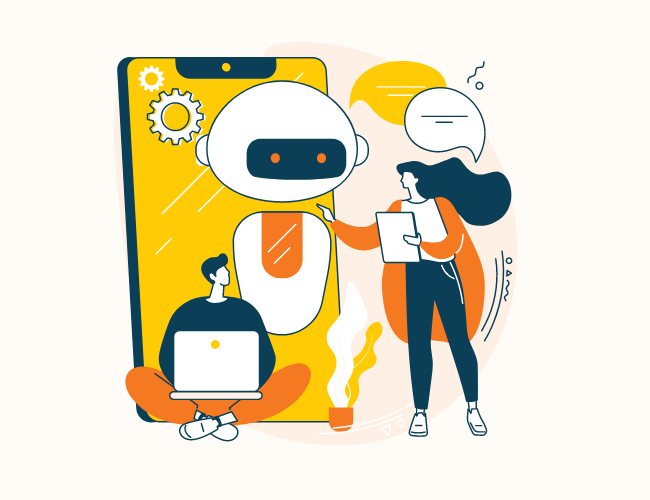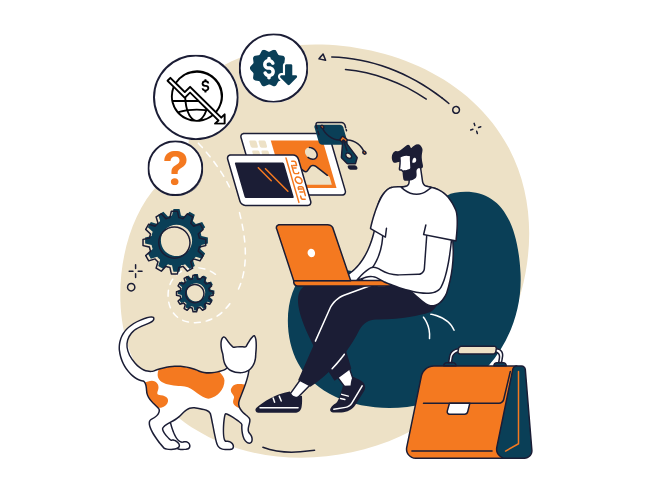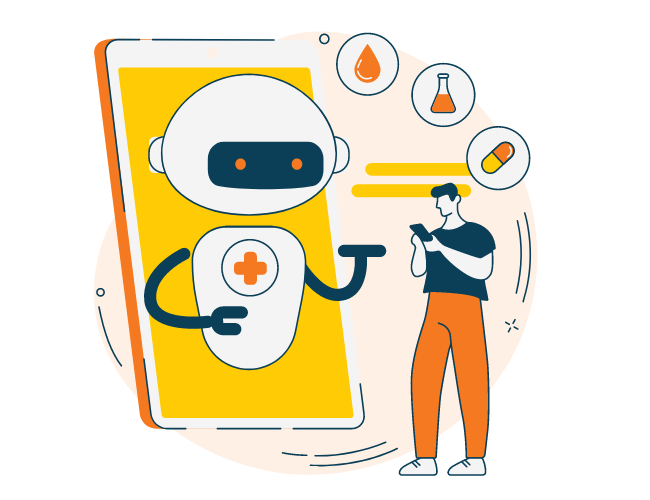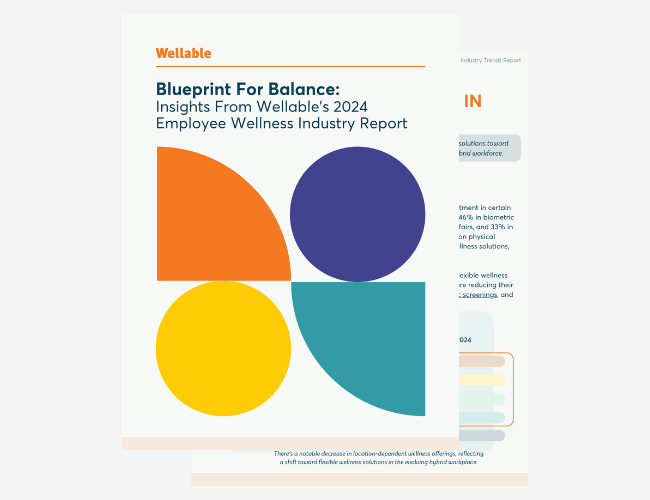Artificial intelligence (AI) is positioned to become an integral part of our everyday lives, transforming the way we work, communicate, and access information. Its impact is particularly profound in the field of health care, where it’s poised to make significant strides.
A recent survey, conducted by Outbreaks Near Me and SurveyMonkey, uncovers insights into public sentiment about AI and its adoption in primary care. It offers a glimpse into AI’s fascinating potential and the shifting tides of perception.
This article examines the survey’s results, explores AI’s trajectory in health care, and reveals what this means for the world of employee wellness.
Pressed for time? Here’s a quick summary…
- Nearly a third of US adults are ready for AI-led health care, but the majority still prefer medical professionals.
- While there is currently a low adoption rate of AI among health care providers, both the general population and health care professionals believe that AI will play a larger role in health care within the next five years.
- AI can transform health care by addressing workforce shortages, enhancing practitioners’ roles, and improving patient care. However, AI introduces ethical dilemmas that must be addressed through proof, transparency, and robust regulations.
- Wellness program selection, personalization, and navigation are some of the most powerful applications of AI in the workplace.
- Ethical considerations, like privacy and bias, should always be at the forefront when implementing AI in the workplace.
Unpacking The Survey: Public Perception Of AI In Health Care
The survey reveals that while AI is gaining attention, most people still prefer medical professionals over AI for important health care tasks.
However, a substantial number of participants are showing comfort with the idea of AI involvement in health care:
- 32% of participants claim that they would be comfortable with AI-led primary care appointments;
- 25% expressed the same level of comfort with AI-led therapy; and,
- 40% of younger adults aged 18-34 are more open to AI-led health care, compared to just 24% of those aged 65 and older, showing a clear generational divide.
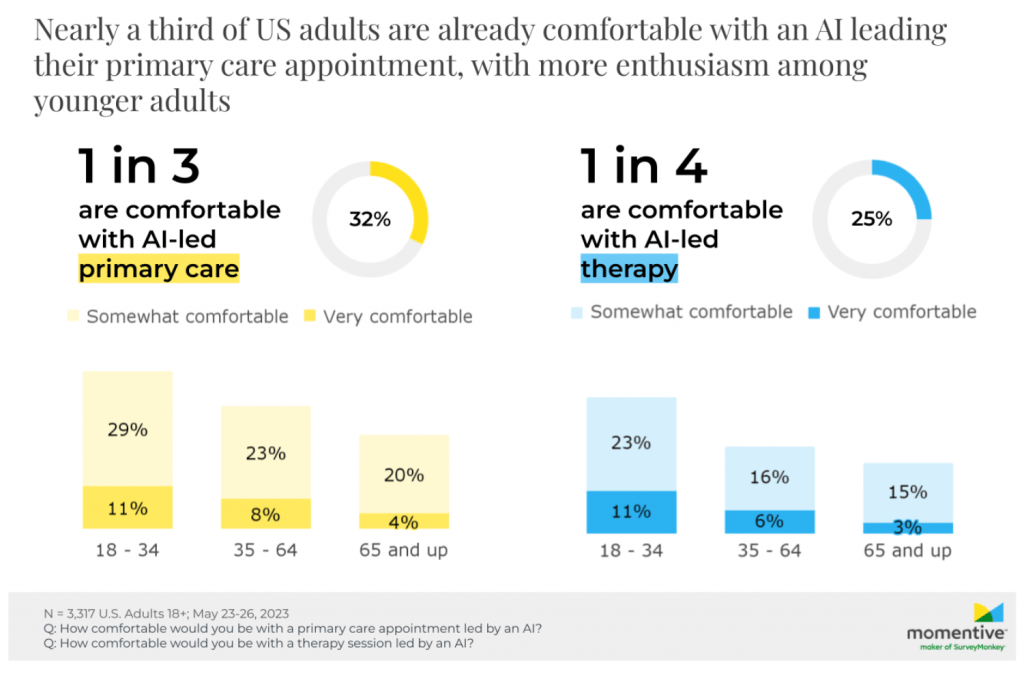
Given that AI in health care is a relatively new concept, it’s intriguing that a significant subset of individuals, while still a minority, are already comfortable with AI-driven health care. This could be attributed to the accessibility and convenience of AI technologies, particularly appealing to younger generations who are more tech-savvy and perceive AI as a reliable option.
Several factors may contribute to increased acceptance of AI in health care:
- Trained & Specialized AI: The emergence of targeted AI for health care systems on the market might make people more receptive than they would be to hypothetical AI scenarios.
- Integration Into Daily Life: As AI continues to integrate itself into various aspects of daily life, it’s likely that people will become more open to its inclusion in health care.
- Observation Of Others: When individuals witness friends, family, or health care providers embracing AI, they may become more inclined to try it themselves.
AI In Action: Current & Anticipated Use In Health Care
Only 14% of health care professionals report leveraging AI for diagnosis, treatment, or patient communication. This indicates a low adoption rate among health care providers, with the majority (83%) not employing any AI for these tasks.
Health care professionals hold varied opinions on AI:
- 23% believe it will help more than hurts;
- 33% think it will hurt more than it helps; and,
- 42% perceive a balance of benefits and drawbacks.
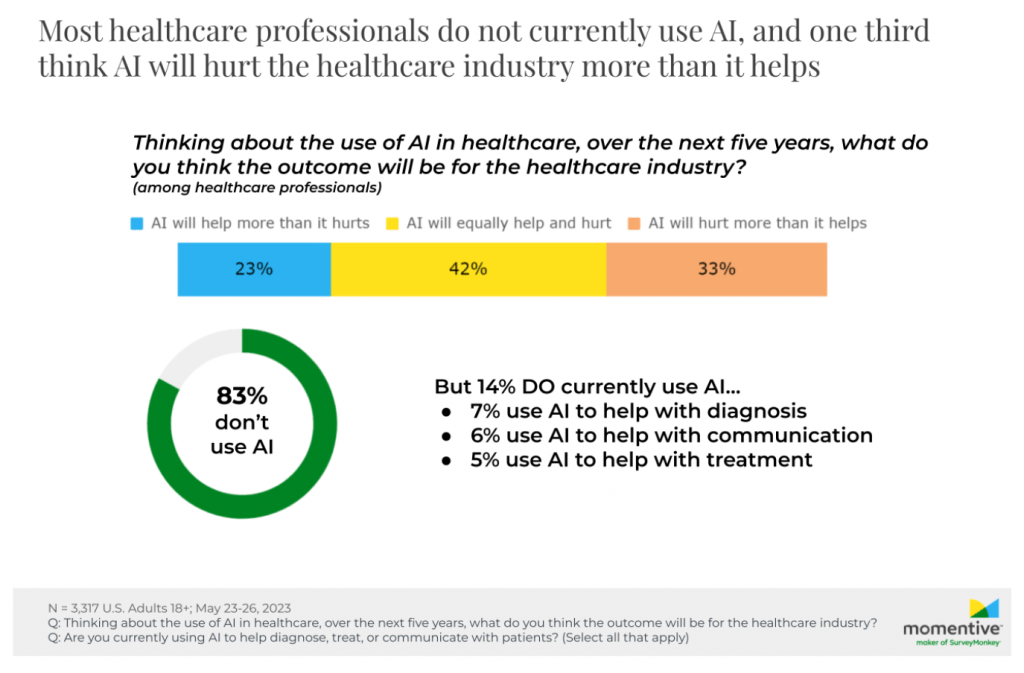
Despite the current limited utilization of AI in health care, a significant 66% of respondents expect AI to play a larger role in health care within the next five years. The survey reflects a shared belief among both the general population and health care professionals that AI will have an expanded presence in health care, demonstrating a widespread recognition of AI’s potential benefits in the health sector.
Several factors may decrease hesitancy of AI in health care among professionals:
- Targeted AI Solutions: Providers are more likely to embrace AI if it offers clear value and utility by addressing existing gaps within health care delivery and improving patient care.
- Widespread Adoption Of AI Within Health Systems: When health care systems and facilities invest in promising AI technologies and integrate them into their operations, individual practitioners will likely be inclined to adopt AI in their practices.
- Presence Of AI Champions: Advocates of AI within medical professional networks who demonstrate its benefits can instill confidence among their peers, encouraging broader acceptance of AI.
These factors play a crucial role in fostering a positive attitude towards AI in health care and facilitating its integration into medical practice.
AI’s Potential To Transform Health Care
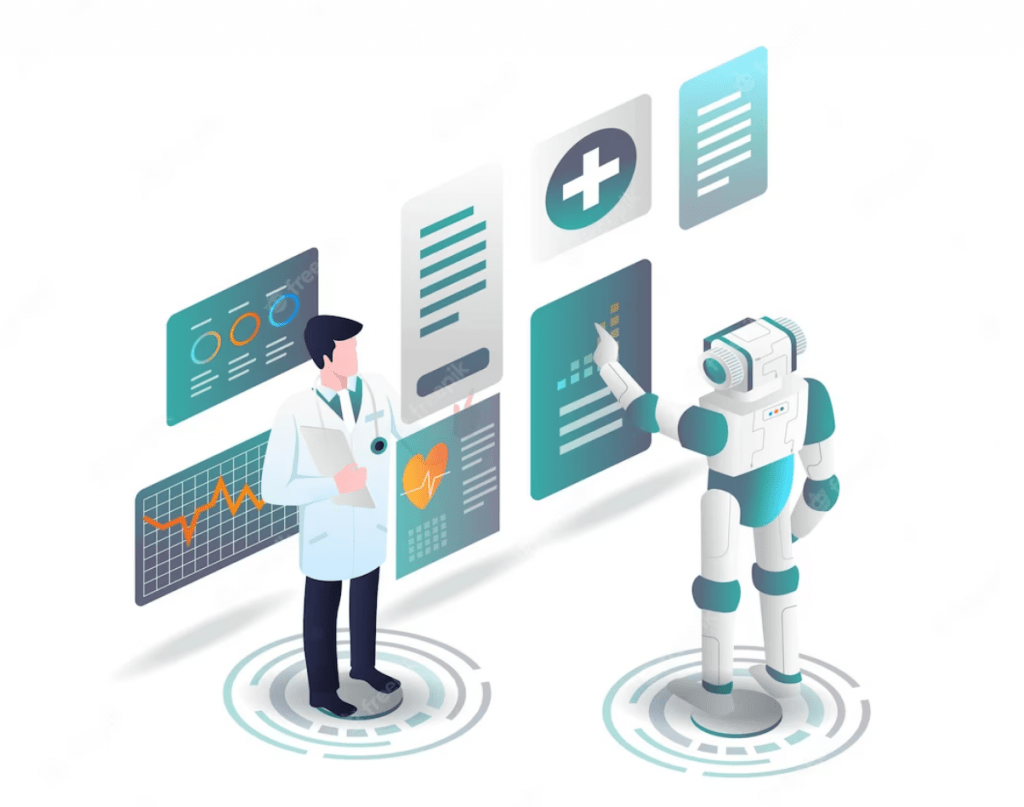
Workforce Dynamics: Bridging Gaps
Leveraging AI in health care systems can help address the challenges posed by workforce shortages. The demand for health care workers is projected to rise to 18.2 million across Europe by 2030, while the current supply falls short at 8.6 million nurses, midwives, and health care assistants.
AI has the potential to alleviate this shortage by automating routine administrative tasks, which consume up to 70% of a practitioner’s time. By liberating time and resources, health care professionals can focus their expertise on critical areas of patient care to meet growing demands. This can also enhance the lives of practitioners, reducing burnout and reigniting their sense of purpose through increased dedication to direct patient care.
Patient Experience: Improved Health Outcomes
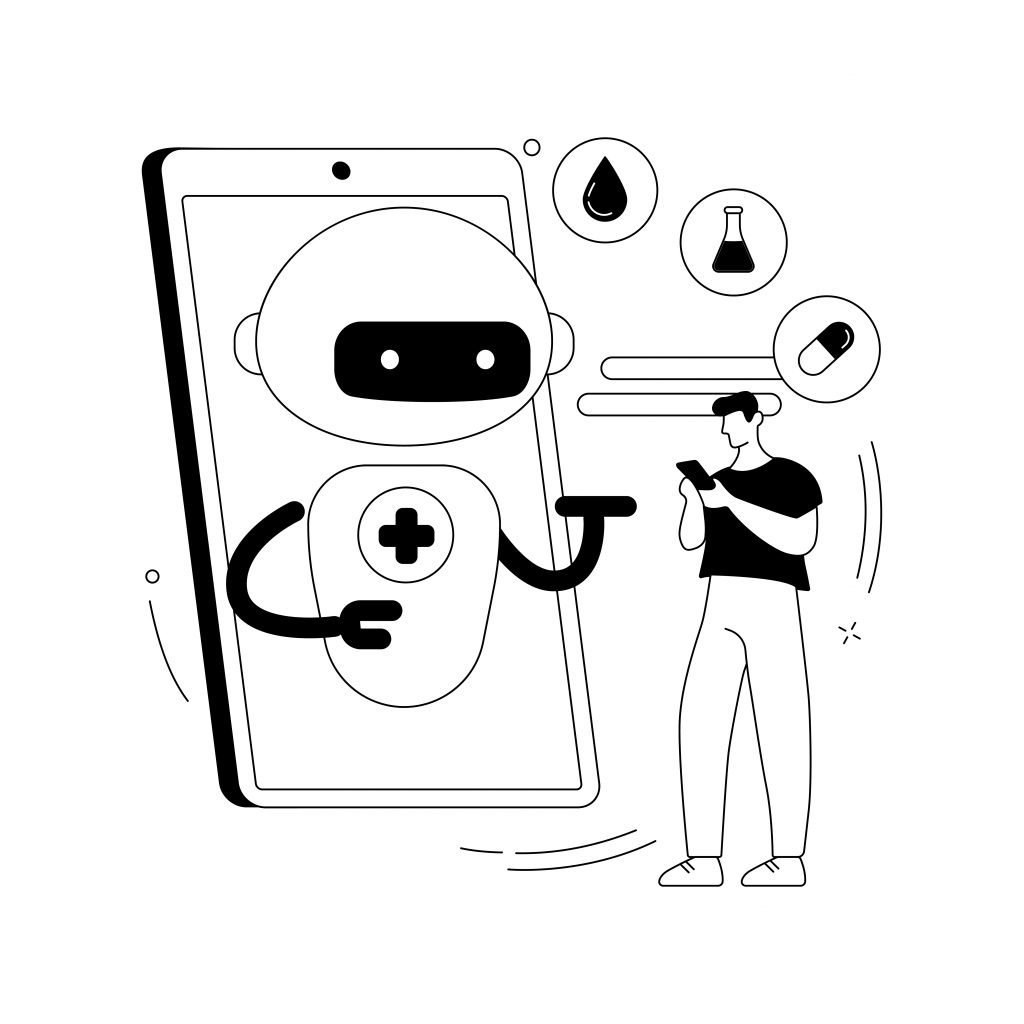
AI prompts a fundamental change in patient experience. It can provide practitioners with faster and more accurate diagnostics and access to extensive medical knowledge, enhancing clinical decision-making and reducing medical errors. Remote monitoring through apps, online symptom checkers, e-triage AI tools, and virtual agents can facilitate more personalized care and empower patients to take control of their health.
Challenges & Ethical Considerations Of AI
Ethics & Evidence Requirements
The adoption of AI in health care is not without ethical dilemmas. While startups may be eager to scale their solutions quickly, health care practitioners must acquire sufficient proof that any new idea will not harm patients. They must also develop a deep understanding of how AI works, the source of underlying data, and any potential biases embedded in the algorithms.
Transparency
Transparency is another critical aspect to ensure the responsible use of AI in health care. There must be transparency between innovators and practitioners, health care providers and their staff, and practitioners and patients, including clear communication of the benefits and risks. This transparency not only helps to build trust among stakeholders but also facilitates informed decision-making. Additionally, it enables health care professionals to understand the limitations and potential biases of AI systems, empowering them to use AI tools appropriately and effectively in the context of patient care.
Regulations & Guidelines
Robust regulations and guidelines are necessary to ensure ethical and effective AI implementation. Establishing clear guidelines for product approval, accountability, governance, and litigation protects patient rights and well-being. This includes clarifying the extent to which patient access to AI tools should be regulated and determining the appropriate level of oversight. By implementing comprehensive regulations and accountability frameworks, health care systems can protect patients and ensure the responsible use of AI in health care.
What This Means For Employers
How will implications for an increasingly AI-dominant health care system shape the future of employee wellness?
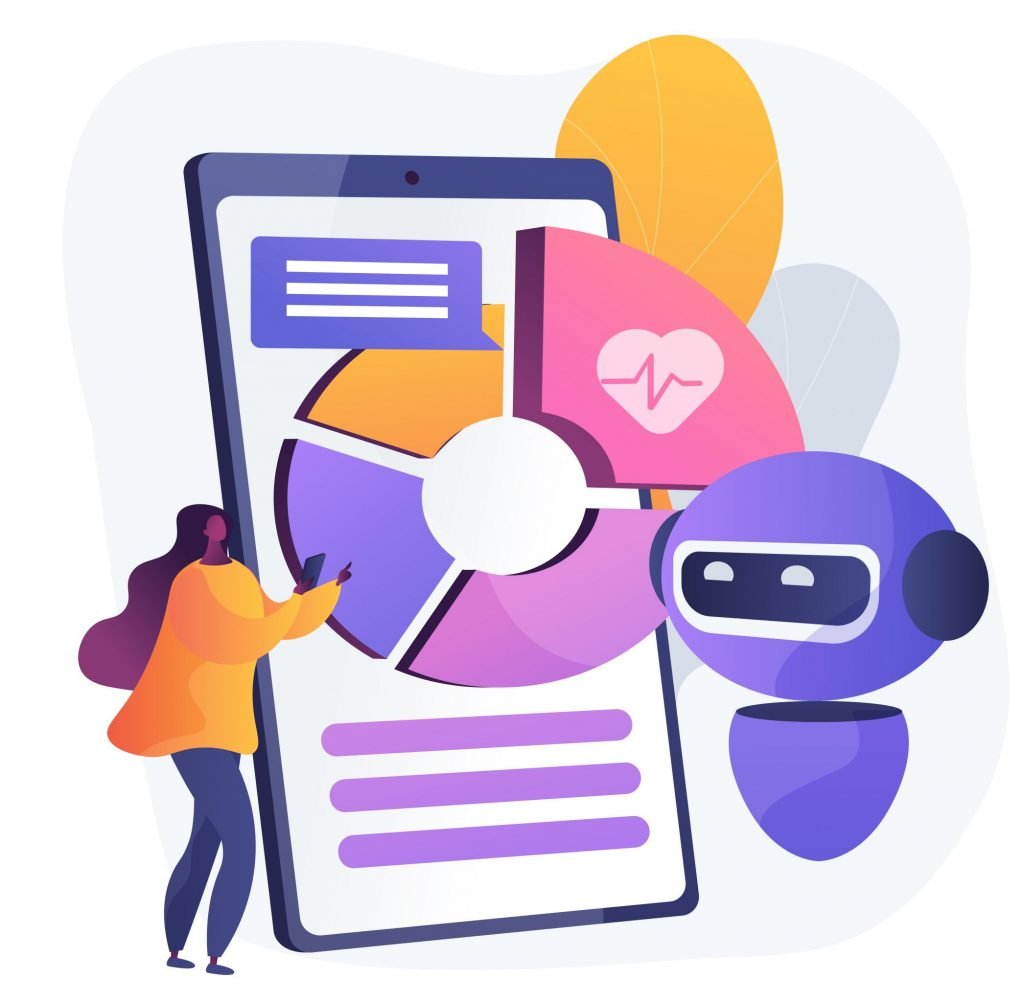
AI Integration In Workplace Wellness Programs
AI-powered wellness solutions have several applications within corporate wellness programs to enhance employee and administrative experience:
- Wellness Program Personalization: AI solutions can make health recommendations based on employees’ indicated needs and preferences, creating a more customized and engaging experience.
- Wearable Technology Advancement: Advanced wearable technology could supplement a corporate wellness program by providing medical alerts and health recommendations based on the wearer’s health history and metrics. Apple Quartz, for example, is envisioned to be an AI health coach that delivers tailored nutrition, fitness, and sleep recommendations using Apple Watch data.
- Informing Benefits Decisions: AI-based decision-making programs can help employees make informed health plan decisions by analyzing their personal health risks and financial information.
- Wellness Program Selection & Navigation: Accessible AI solutions, like ChatGPT, can serve as HR assistants for organizations in search of the optimal wellness program, saving time sifting through search engines to come across a match.
- Feedback Optimization: Through natural language processing, AI can interpret neutral responses and consolidate open-ended feedback provided by employees. This allows organizations to gain accurate, actionable insights regarding feedback for wellness programs while freeing up valuable time for HR teams and executives.
Ethical Considerations Of AI For Employers
Ethical considerations should always be at the forefront when implementing AI in the workplace. AI relies on collecting and analyzing sensitive health information, underscoring the need for:
- Privacy Protocols: Implement clear privacy protocols to protect employee privacy and ensure the secure collection, storage, and use of sensitive health information.
- Addressing Bias: Ensure that AI systems are trained on unbiased data and actively address potential biases to avoid unfair or discriminatory healthcare outcomes.
While some employees, particularly younger generations, may be eager to embrace AI tools in the workplace, not everyone will feel comfortable with this technology. It’s vital to ease employee fears and misconceptions about AI through:
- Education And Communication: Provide comprehensive training programs and open channels of communication to address employee fears and misconceptions about AI, helping them understand its usage, limitations, and benefits in the workplace.
- Visibility Into AI Systems: Allow employees to have visibility into the AI systems being used and how their data is being processed, promoting transparency and fostering trust.
- Autonomy For Employees: Offer employees the autonomy to choose whether they want to incorporate AI tools in their work and provide options to opt out if they prefer, respecting individual preferences and concerns.



